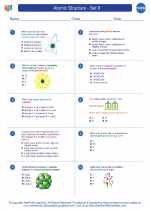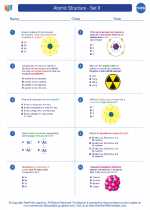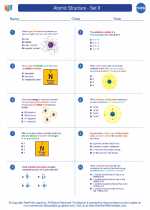Combustion Reactions
Combustion reactions are a type of chemical reaction in which a substance combines with oxygen to produce heat and light. These reactions are also known as burning reactions and are an important part of many natural and industrial processes.
General Equation
The general equation for a combustion reaction is:
Fuel + Oxygen → Carbon Dioxide + Water + Heat
Examples
Some common examples of combustion reactions include:
- Burning of wood: C6H12O6 + 6O2 → 6CO2 + 6H2O + Heat
- Combustion of methane: CH4 + 2O2 → CO2 + 2H2O + Heat
- Burning of gasoline: C8H18 + 25/2O2 → 8CO2 + 9H2O + Heat
Study Guide
When studying combustion reactions, it's important to understand the following key concepts:
- Fuel: The substance that undergoes combustion. It can be a hydrocarbon, alcohol, or any other substance that can react with oxygen.
- Oxygen: The oxidizing agent that combines with the fuel during the combustion reaction.
- Products: The substances produced as a result of the combustion reaction, which typically include carbon dioxide, water, and heat.
- Energy Release: Combustion reactions release a significant amount of heat and light energy due to the rapid oxidation of the fuel.
- Applications: Combustion reactions are used in various applications, including combustion engines, heating systems, and industrial processes.
When working with combustion reactions, be sure to balance the chemical equations and understand the stoichiometry involved in the reaction. Additionally, consider the environmental impact of combustion reactions, particularly the release of carbon dioxide and other pollutants.
Overall, combustion reactions are an important aspect of chemistry, with practical applications in everyday life and industry.
[Combustion Reactions] Related Worksheets and Study Guides:
.◂Chemistry Worksheets and Study Guides High School. Atomic Structure - Set II

 Worksheet/Answer key
Worksheet/Answer key
 Worksheet/Answer key
Worksheet/Answer key
